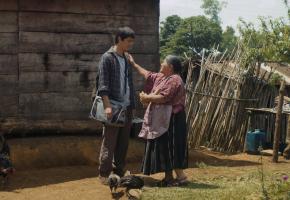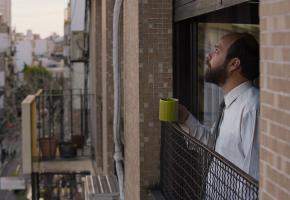Shady River (Río Turbio), a film named after the mining town in northwest Argentina in which it is set, explores the gendered space of the mine, giving voice to a collective of women marginalised by it and shedding light on the tragedies that haunt the town.
In Río Turbio, a coal-rich town in Argentinian Patagonia, a local superstition effectively bans women from setting foot inside a mine. The myth warns that should a woman enter a mine, the ‘black widow’ will become jealous, and engender chaos and destruction as a result. Using this myth as a starting point, Shady River explores the historic marginalisation of women in this mining town, as well as the brutal reality of the lives of the miners and their families, for whom tragedy and death has become commonplace.
Shady River is inspired by director Tatiana Mazú González’ own family history. She was prompted to create the film after watching a video of a holiday her family took to the mine when González was a child, and this footage features in the film. Memory is key in Shady River. González relies on the collective and layered memories of the women of Río Turbio. Through a series of audio recordings, screenshots of text conversations and cartographic diagrams, she builds her own archive of the struggle of the mujeres del carbón (coal women) so that the film itself becomes a document.
González sheds light on the role of women in the miner’s struggle, one that had largely been made invisible prior to the creation of Shady River. Her aunt and other women of Río Turbio recount spending months at camps protesting the conditions of the mine and creating a radio station to spread word of these injustices. Shady River is an ode to these women, and an attempt to inscribe their story of resistance into the political and historical narrative from which they have been excluded.
González says that first and foremost she is a political activist. ‘The kind of cinema that interests me is one that embraces the tension between a programmatic militant cinema and experimental cinema.’ Indeed, while the film is a clear call to action to improve conditions for miners and deconstruct the gendered territory of the mine, the imagery and messaging of Shady River is by no means transparent. The aural and visual metaphors require gentle unpacking and the director’s background as a visual artist is apparent.
As a woman, González was not allowed to enter the Río Turbio mine even to film. Because of this, aside from some archival footage, the only shots we see of the mine are from above. In Shady River, more weight is carried in the unseen, the unsaid, and the unspeakable, than what we can see and hear on the screen. Shots of a heavy, suffocating fog that linger over the town visually illustrates the silence and trauma that engulfs Río Turbio.
‘Can our voices dissolve the fog?’ Tatiana’s aunt asks in one scene. Certainly, González attempts to dissolve the fog of trauma and silence clouding over Río Turbio by uplifting the voices of these previously marginalised women. The story of Shady River is one of resistance and stoicism in the face of a patriarchal society which relegates women to second-class citizens.
While local superstition suggests the women of Río Turbio are only good for making food or participating in beauty pageants, González highlights the active role these women have played in the struggle against the dangerous conditions of coal mining, as well as their attempt to deconstruct the gendered space of the mine.
Jasmine Haniff is a student at Goldsmiths College, London. As part of her course, she worked with LAB on a series of articles about the impact of mining on bodies of water and their surrounding communities.
Shady River was part of the Open City Documentary Festival selection, running 8-23 September, 2021 in London and online.
















